#Díriel
Explore tagged Tumblr posts
Note
Oh, friend! I nearly forgot to send YOU asks for the WIP Game! Could you tell me a bit about "End of Angband" and "Here's to the ones who dream", please?? <3
Here's to the Ones Who Dream is a longfic (with the obvious disclaimer that my standards for 'longfic' are probably somewhat shorter than most people's) about Faramir. I've started on it a year and a half ago tbh 😅 and now what I've got (about his childhood) is in the middle of a rewrite and then I have to bring up his relationship with Gandalf, and his scholarly pursuits... and as always I find I don't know how far into his life it's supposed to go -- maybe the beginning of his military life? It's written in the context of his own reminiscences and right now I'm experimenting with tense and person, so it's kind of in the stage of being a playbox for my own headcanons, but I think it deserves a honourable mention for being one of the oldest fics I haven't wholly abandoned.
The title is a reference to his dreams (the specific kind Faramir is famous for) which are focused on a lot, at least in the early bits as I first envisaged them.
End Of Angband in its first iteration focuses on two of my OCs: Díriel (M, Noldo) and Lóreth (F, Silvan-Sindarin) who are both thralls in Angband; it's told from the POV of Díriel and spans from his capture (and meeting with Lóreth) to the downfall of Morgoth.
In case you're wondering... they're not a couple, but they're not not a couple either - Angband is absolutely not conductive to forming relationships, but do they end up being the light in a dark place for eachother...? yeah. And after the First Age it develops somewhat bittersweetly with Díriel returning to Valinor with the Host of the West and Lóreth going on to help found Rivendell one day... and they both feel a little unrequited longing "but after all they're not lovers so..."
(They absolutely will get together in the Fourth Age but there's a long way between now and then)
That said, while I've grown attached to the two I have doubts whether they're really conductive to the goal I actually want to achieve here, so the second itineration of the project I'm debating on is just a one shot about the War of Wrath from the perspective of an anonymous thrall.
...It takes a lot from my WW2 reading and the impression I get from concentration camp memoirs (and one specific memoir in particular) when they talk about the very end of the war -- I'm not denying that some of the most horrible atrocities happened while the camps were being dismantledz but on the other hand there is often this sense of who's winning the war being an open secret and this chaos beyond enemy lines and... it's not eucatastrophe because terrible things are still happening but it causes similar feelings in me and it's fascinating to read about.
(I hope it's not disrespectful per se to have something so awful inspire your fantasy writing, but on the other hand all fantasy is inspired by irl history, and it's not like this isn't my own national heritage so...)
10 notes
·
View notes
Text
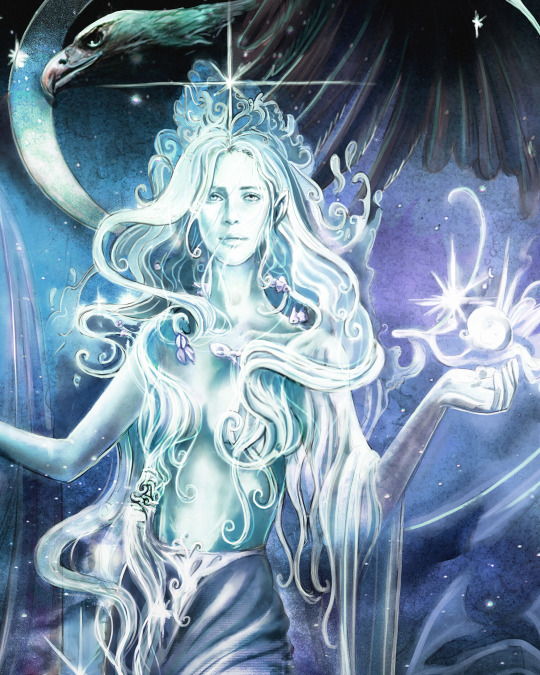
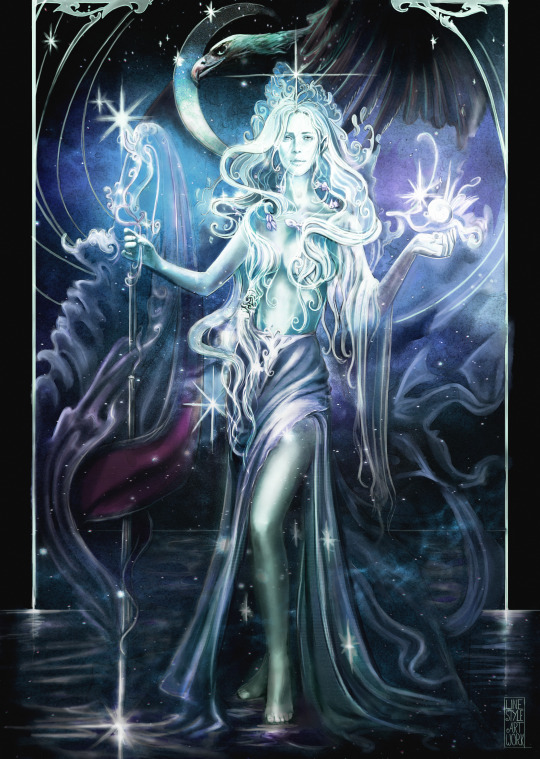
"A Elbereth Gilthoniel"- personal art 2021 (available as print in my shops: https://linktr.ee/l )🧝♀️🌟
'A Elbereth Gilthoniel silivren penna míriel o menel aglar elenath! Na-chared palan-díriel o galadhremmin ennorath Fanuilos, le linnathon nef aear, si nef aeron!'
#tolkien#illustration#art#middleearth#lotr#artistsofinstagram#varda#elvesofinstagram#artist#artwork#annajägerhauer#linestyleartwork#silmarillion#elves#light#stars#night#drawing#sketch#herrderringe#deviantart#jrrtolkien#artistsontumblr#elvesontumblr
203 notes
·
View notes
Text
Ambarussa Appreciation
I have said before that I think Amrod and Amras have much untapped imaginative potential. But that's not to say there are no intrepid creators who have done marvellous work with the sixth and seventh sons of Fëanor. Here are some of them! Feel free to reblog this with additions of your own.
Fics
A Kind of Mercy by @aipilosse (T, 0.8k). Amras & Amrod. A haunting character study.
truth in a mirror by athenakarthagonensis (E, 4.4k). Amrod/OMC. Stunning prose and a dangerous lightly-toasted Amrod. The unique Green-elf POV is excellent.
The White Tower by Anna_Wing (not rated, 11.2k). Post-canon Elwing-focused fic (fascinating worldbuilding and musings on the nature of the Oath), but interesting and refreshing to see her interacting with the 'forgotten' Kinslayers.
Who By Fire by me (M, 4.9k). Amrod/Fingolfin. Two grief-raw souls connect at Mithrim. Lightly-toasted Amrod. cw: past attempted suicide, mental instability, injury, animal death.
The Same Blood by me (T, 1k). Amras and Amrod's relationship feels the strain of what they have been through. Follow-up to the previous fic.
as a mist of light, chapter 12 by @swanmaids (T, ficlet). Amras finds a way to cope after the fire. Crispy Amrod. cw: self harm.
We Shared Everything by @cuarthol (M, 2.2k). Amras and Amrod shared everything, until they didn't. Crispy Amrod. Fantastic use of first person (plural and singular).
Dénouement by @sallysavestheday (G, 0.9k). Amrod/Aredhel, post-canon. Two people who were killed by people they love find understanding in each other. Crispy Amrod.
A Name by @skyeventide (G, 1k). Beautiful and impactful musings on identity, pulling from the convoluted and complex names associated with these two. Lightly-toasted Amrod.
The Seven Trials of Fingon the Valiant, chapter 6 by me and @melestasflight (T, ~2k). Something lighter! The twins seduce Fingon.
Art
There is actually a pretty rich array of fanart of Amrod and Amras. Here are just a few of my favourites.
Amras and Amrod by @wisesnail
Amras and Amrod by @welcomingdisaster
Amrod threatens Elrond and Elros by @runawaymun, a chilling commission for my fic And Love Grew
Amrod by @myceliumelium
Amras and Maedhros by @redbootsindoriath
Amrod by @tabukomi
Ambarussa by @thelien-art
Ambarussa by @spvce-oddity
Maedhros, Celegorm, Amrod, Amras by @albuum
Any finally some HoMe quotes about the twins, who get so little in the published Silm.
325 [525] Torment fell upon Maidros and his brethren, because of their unfulfilled oath. Damrod and Díriel resolved to win the Silmaril, if Eärendel would not give it up willingly. […] 329 [529] Here Damrod and Díriel ravaged Sirion, and were slain. Maidros and Maglor were there, but they were sick at heart. From 'The Later Annals of Beleriand' in The Lost Road
"The two twins were both red-haired. Nerdanel gave them both the name Ambarussa - for they were much alike and remained so while they lived. When Fëanor begged that their names should at least be different Nerdanel looked strange, and after a while said: 'Then let one be called [Ambarto >] Umbarto, but which, time will decide."
"The twins called each other Ambarussa. The name Ambarto/Umbarto was used by [?no one]. The twins remained alike, but the elder grew darker in hair, and was more dear to his father. After childhood they [?were not to be] confused…" From 'The Shibboleth of Fëanor' in The Peoples of Middle-earth
95 notes
·
View notes
Text
I'm breaking with tradition to celebrate the first anniversary of the Watermill Theatre's production of The Lord of the Rings: A Musical Tale! This production was so full of heart and creativity, it was impossible not to be moved by it.
For the anniversary, @lotrmusical created a wheel of prompts based on people's favourite aspects of the production, and the prompt I got was "STAR OF EÄRENDIL ACAPELLA MOMENT. CHILLS FOREVER". So I've recorded the last few verses of the song "Star of Eärendil", which takes place as the Fellowship assemble to leave Rivendell - including the moment where (in the Watermill production) the instruments drop out and only the voices remain. That moment gives me chills too, so I hope I've done it justice!
Lyrics (and a note on the pronunciation of Eärendil) under the cut.
Lead us ever onward, our weary hope sustaining
Now strengthen our endeavour, our purpose unite
Clothe us in your courage, your hope become our armour
(Eärendil Elcirion mi giliath)
Your wisdom be our banner of light
(Chaered palan-díriel, aiya, aiya!)
Elbereth Gilthoniel, look down, hear our cry
(Elbereth Gilthoniel)
May the stars that once you kindled ever burnish the sky
(Star of Eärendil)
Shining ever bright, your hope and your healing light
Guide our way and aid us from on high
O Elbereth
Hear our cry!
On pronouncing Eärendil "Yarendil": this is an innovation from the musical, which views itself as a production put on by hobbits to remember the stories they've inherited. So you can assume this is a hobbit mispronunciation, or you can see it as a legitimate variant (the dialectal form "Yarendl" is attested: see Qenya Lexicon 105). Either way, don't sweat it.
#watermill anniversary creative celebration#tolkien#lotr musical#arwen evenstar#eärendil#fellowship of the ring#rivendell
42 notes
·
View notes
Note
A quaint town. it's people normal. It's architecture medieval eastern european. Surrounded by a wall seperating the town from the farm land just past it. The wall was erected during a time in which wolf populations bloomed. There are many a livestock housing in the city. There was a tower erected along the wall when a wandering psychic came to town and foretold of great flames that would come from the east and envelope the town. With the tower a woman spotted a small brush fire just outside the drying wheat fields. There was only a small fire. But there could have been a great one. A bell shop sits in the center of town. It was erected on the outskirts of town after it was founded. Merchants would come often back then. There was much fog in the area for many years and the merchants would buy a bell to find their way.
For as long as the people had been in the area, there had always been I lothron. Once upon a time, it was the center of many superstitions.
"Don't go into I lothron," parent's would warn their children, "It'll eat you whole!"
"Don't go into I lothron," locals would tell travelers, "You'll never find your way out."
"Don't go into I lothron," the Elders would frown, "You will fall prey to Draugr Lhûg ."
Aelin Edain was founded by a group of refugees, on the run from accusations of witchcraft. They'd been chased from their homes, their countries, and into the woods of the one place they'd never be followed: Rómenna.
I lothron had been there even before I Neldë settled there, covering Rómenna for as far as the eye could see. They found it to be great cover. It kept away intruders. Soon, though, they found that it kept them in just as much as it kept others out.
Within their haven of Aelin Edain , they built themselves a life. Farms, orchards, livestock, homes, and eventually roads for safe passage through I lothron.
Two generations after I Neldë died, passing onto I Dîriondir Ashtarin, the villagers wanted to venture out. They wanted to see the world, trade their wares, live outside of Ithil Caelum.
The first to venture into I lothron was a blacksmith's child carrying nothing but a knife, a torch, and a bell made my his mother.
Ninquea, as he was known as, ventured into I lothron for three days and two nights, emerging on the other side of Rómenna on the afternoon of the third day. He ventured into the lands unknown to him, returning only a month later with a single wolf hide traded for his knife.
The people of Aelin Edain cheered when Ninquea returned. They asked him how he'd survived I Iothron, and he said he held his torch true and rang his bell.
In his honor, they built a bell tower just on the outskirts of Aelin Edain.
The night the bell tower was finished, three weeks after Ninquea's return, wolves ransacked the town. They trampled the fields, killed the all the livestock they could find.
The people wondered, what had caused the wolves to be angry with them?
"I Iothron is upset with us!" the Elders cried, "It offered I Neldë protection and Ninquea spat on it's gift! Now it sends Draugr Lhûg to make us all pay!"
The people built walls around Aelin Edain, taller than their tallest man, with a single wooden gate. Above the gate was a golden bell, taken from the bell tower. Every night, the bell would ring and the gate would close. Every night, the wolves would charge the walls, but they could not get through.
Three winters passed, and through I Iothron came the chime of a bell and the light of a torch. Through the gate, a woman dressed in the richest of greens and golds made her way. She stopped for nothing until she reached the bell tower, directly opposite the gate.
"My name is Díriel Elariel," she told the gathered crowed in a whisper, the wind carried her words. "You are in danger."
The Elders prayed to I Iothron for forgiveness and safety. The children scoffed.
"Danger?" A child called Cuilen ésë said, "We are safe here. The wall protects us."
Díriel Elariel smiled at the child, her eyes shining through the shadow cast by her hood. "Fëanoriel angers. From the East, he sends his nindë."
"How long?" an Elder sobbed, "How long until Fëanoriel's nindë reach our walls!"
"Until the seventh bell tolls." The wind picked up, the bell over the gate rang once, and she was gone as though she'd never been there.
Eight generations and six bell tolls passed. A woman, Naithol, climbed to the top of the bell tower, as she had done many times since the day she was gifted to her mother by Ithilëa Míriel. From there, she could see everything until the horizon faded into the trees of Rómenna and the cliffs of Nénuvalon.
She screamed, alerting the people of Aelin Edain.
"What is it?" her brother called, "What did you see?"
"Nindë!" she cried, "Nindë in the East!"
Elvish Translator I lothron - The Fog Aelin Edain - Ancient Lake Rómenna - Boaderlands I Neldë - The First I Dîriondir Ashtarin - The Fields of Ashtrees Ithil Caelum - The Lake Fog Ninquea - Bellchild Draugr Lhûg - Dire Wolves Díriel Elariel - Lady Fawn Cuilen ésë - Farmchild Fëanoriel - Prometheus nindë - flames Naithol - Falsecry Ithilëa Míriel - The Mother Goddess Nénuvalon - Ocean Man
#writing#my writing#writing prompt#void writes#ask prompt#thanks for the ask!#i had a lot of fun with this <2#i hope you like it!#very on-the-nose names but they're in elvish so they're fancy
4 notes
·
View notes
Text
"Then his sons beside him, the seven kinsmen, crafty Curufin, Celegorm the fair, Damrod and Díriel and dark Cranthir, Maglor the mighty, and Maidros tall (the eldest, whose ardour yet more eager burnt than his father’s flame, than Fëanor’s wrath; him fate awaited with fell purpose), these leapt with laughter their lord beside, with linkëd hands there lightly took the oath unbreakable; blood thereafter it spilled like a sea and spent the swords of endless armies, nor hath ended yet: ‘Be he friend or foe or foul offspring of Morgoth Bauglir, be he mortal dark that in after days on earth shall dwell, shall no law nor love nor league of Gods, no might nor mercy, not moveless fate, defend him for ever from the fierce vengeance of the sons of Fëanor, whoso seize or steal or finding keep the fair enchanted globes of crystal whose glory dies not, the Silmarils. We have sworn for ever!’ Then a mighty murmuring was moved abroad and the harkening host hailed them roaring: ‘Let us go! yea go from the Gods for ever on Morgoth’s trail o’er the mountains of the world to vengeance and victory! Your vows are ours!" The Lays of Beleriand II, The Flight of the Noldoli from Valinor
"Your way shall never lead you hither more, nor any son of Fëanor; nor ever after shall be bond of love twixt yours and Nargothrond.’ ‘We will remember it,’ [Celegorm and Curufin] said, and turned upon their heels, and sped, and took their horses and such folk as still them followed." The Lays of Beleriand III, THE LAY OF LEITHIAN X
"Therefore [Thingol] sent back the messengers with scornful words. Maedhros made no answer, for he had now begun to devise the league and union of the Elves; but Celegorm and Curufin vowed openly to slay Thingol and destroy his people, if they came victorious from war, and the jewel were not surrendered of free will." The Silmarillion, Chapter 20: OF THE FIFTH BATTLE: NIRNAETH ARNOEDIAD
"There fell Celegorm by Dior’s hand, and there fell Curufin, and dark Caranthir; but Dior was slain also, and Nimloth his wife, and the cruel servants of Celegorm seized his young sons and left them to starve in the forest." The Silmarillion, Chapter 22: OF THE RUIN OF DORIATH
Ride or kill die
#silm#celegorm#fëanorians#fëanorians keep their words basically even if it's not the royals themselves#at least the truly real ones#curufin#second kinslaying#anyway I reblogged a far more eloquent post about it prior but in a grim way that's truly my favourite demonstration of loyalty in the Silm#(only potentially beaten out by the followers that wanted to accompany Maedhros to his Silmaril theft but they got erased)#for all the C&C suffer most from the “good” vs “bad” SoF discourse they also evoke such loyalty...
15 notes
·
View notes
Text

A Elbereth Gilthoniel
silivren penna míriel
O menel aglar elenath!
Na-chaered palan-díriel
o galadhremmin ennorath,
Fanuilos, le linnathon
nef aear, sí nef aearon!
A Elbereth Gilthoniel
o menel palan-diriel,
le nallon sí di'nguruthos!
A tiro nin, Fanuilos!
This is the Mother Mountain behind my Home and when I got out this afternoon I felt amazed watching the light and the mist around me and I truly felt like I had stepped into the mythical word (or maybe all of our planet looked like this) and I really wanted to take a picture, so here it it is alongside Varda's hymn because she is the best and I love her so much 💙
14 notes
·
View notes
Text
[Audio description: a recording of me singing outside. The tune is in a minor-like key and is reminiscent of medieval plainchant. The lyrics are as follows:
A Elbereth Gilthoniel
Silivren penna míriel
O menel aglar elenath
Na-chaered palan-díriel
O galadhremmin ennorath
Fanuilos, le linnathon
Nef aear, sí nef aearon!
End audio description.]
live to you from my back alley: a elbereth gilthoniel!
#lotr newsletter#i recorded and am posting this in the evening time after i ate dinner so i'm really leaning into the immersion with this one#i have thursday off so never fear!! earendil will come to your dashboard shortly#this one was just way easier to record after my long long day of sadly not having an epic rager at elrond's house
3 notes
·
View notes
Text
Given that Denethor was known for having long sight, and knowledge of events that happened far off long before his use of the palantir was known of I headcanon that he was often known by the epithet "gwahaedir" or "palan-díriel", the sindarin equivalents of palantir (far-seer). I think Denethor would have liked this, but I enjoy the Tar-Palantir parallel as well.
2 notes
·
View notes
Text
The Strength to Dream
Lyrics: Lately I feel I'm going under, And sometimes I don't want to see tomorrow. All I need is to hold the dream, just to touch the dream, Can it ever happen? Oh, your true sincerity, your kindness, means so much to me; But sometimes it feels like nothing is real except this pain and dark uncertainty.
Lately I've been feeling more like giving it all away; There's been a black cloud over me and now I feel the rain. My dreams never seem to lead me to the open road; And cracks have slowly begun to show in the bridge from here to my only goal.
In the ebb of my mind I try to climb the tower of strength What can fill this cold empty void of what I fear will never be? I find that I follow pathways that lead me nowhere.
The truth is I am chained to my ideals, and I can't change it; But something in me yearns to win; I know real love is there to find us. If I ever stop believing I'll always find the strength to dream. But for now depression smiles down upon me; Oh, what I would give to know you.
A Elbereth Gilthoniel silivren penna míriel o menel aglar elenath! Na-chaered palan-díriel o galadhremmin ennorath, Fanuilos, le linnathon nef aear, sí nef aearon!
1 note
·
View note
Text
step 1: float random concept of transing a character’s gender solely as an etymological exercise based on author’s drafts and notes
step 2: accidentally get attached to concept & then accidentally develop it more
step 3: ???
step 4: profit?
#mine#YES this is abt trans!amras bc i RLLY LIKE the name díriel etymologically#and then i was like ‘hey what if amrod was older but still telufinwë and then he gave That name to amras and got pityafinwë instead’#bc I Think It Would Be Fun.#this post brought to u by the fact that someone posted a trans!amras prompt on the kinkmeme and i’ve been rotating it in my head#not bc i really Want to or bc i think i can write it but Just Because it lines up with the thoughts i’ve Already Had so nicely#it is now living rent-free in my brain. help.#silm
3 notes
·
View notes
Text
The Third Kinslaying
A Silmarillion question that never ceases to trouble me, and for which I am not sure I will ever come up with an answer that satisfies me: What were Maedhros and Maglor’s justifications for taking Elrond and Elros after the sack of Sirion?
I know many people are satisfied with emotion-based reasoning, but that alone just doesn’t work for me personally. I read Maedhros and Maglor at this point in the narrative as very tormented, yes, but still capable of weighing logic and emotion at the same time. I also don't think the tone of the text supports outright villainy and ruthlessness (though that's a valid hc, especially from a non-Feanorian pov).
I’m not going to dive into my interpretation (I’m writing a fic for that), but I wanted to share the evidence and highlight what I think is the (Doylist) explanation for why the question is such a tough one to crack: None of Tolkien’s drafts covering this event* took the character of Gil-galad (or Círdan, though he was a character and not ret con'd like G-g) into consideration. He was simply not a factor in any of the versions published in HoMe.
If you’re like me and love the ‘textual archaeology’ of figuring out how the published text was derived (and since I bothered to type them all up) here are all the drafts of the third kinslaying alongside the published Silm. (There's good stuff in here for enjoyers of Elwing, Maedhros, and Maglor, too -- and haters of Amrod and Amras lol.)
*unless there are unpublished notes or notes that have evaded me somewhere
Book of Lost Tales (late 1910s/early 1920s)
In BoLT, the Havens are sacked by Melko.
Sketch of the Mythology (1926-30)
The sons of Fëanor learning of the dwelling of Elwing and the Nauglafring [=Nauglamir] had come down on the people of Gondolin. In a battle all the sons of Fëanor save Maidros [footnote: > Maidros and Maglor] were slain, but the last folk of Gondolin destroyed or forced to go away and join the people of Maidros [footnote: Written in the margin: Maglor sat and sang by the sea in repentance]. Elwing cast the Nauglafring into the sea and leapt after it [footnote: My father first wrote Elwing cast herself into the sea with the Nauglafring, but changed it to Elwing cast the Nauglafring into the sea and leapt after it in the act of writing], but was changed into a white sea-bird by Ylmir [=Ulmo], and flew to seek Eärendel, seeking about the shores of the world. Their son (Elrond) who is half-mortal and half-elfin [footnote: This sentence was changed to read: Their son (Elrond) who is part mortal and part elfin and part of the race of the Valar], a child, was saved however by Maidros.”
The Quenta Noldorinwa (1930)
I
The dwelling of Elwing at Sirion’s mouth, where still she possessed the Nauglafring and the glorious SIlmaril, became known to the sons of Fëanor; and they gathered together from their wandering hunting-paths. But the folk of Sirion would not yield that jewel which Beren had won and Lúthien had worn, and for which fair Dior had been slain. And so befell the last and cruellest slaying of Elf by Elf, the third woe achieved by the accursed oath; for the sons of Fëanor came down upon the exiles of Gondolin and the remnant of Doriath, and though some of their folk stood aside and some few rebelled and were slain upon the other part aiding Elwing against their own lords, yet they won the day. Damrod [=Amrod] was slain and Díriel [=Amras], and Maidros and Maglor alone now remained of the Seven; but the last of the folk of Gondolin were destroyed or forced to depart and join them to the people of Maidros. And yet the sons of Fëanor gained not the Silmaril; for Elwing cast the Nauglafring into the sea, whence it shall not return until the End; and she leapt herself into the waves, and took the form of a white sea-bird, and flew away lamenting and seeking for Eärendel about all the shores of the world. But Maidros took pity upon her child Elrond, and took him with him, and harboured and nurtured him, for his heart was sick and weary with the burden of the dreadful oath.”
II
Upon the havens of Sirion new woe had fallen. The dwelling of Elwing there, where still she possessed the Nauglafring [footnote: > Nauglamir at both occurrences] and the glorious SIlmaril, became known to the remaining sons of Fëanor, Maidros and Maglor and Damrod and Díriel; and the gathered from their wandering hunting-paths, and messages of friendship and yet stern demand they sent unto Sirion. But Elwing and the folk of Sirion would not yield that jewel which Beren had won and Lúthien had worn, and for which Dior the Fair was slain; and least of all while Eärendel their lord was in the sea, for them seemed that in that jewel lay the gift of bliss and healing that had come upon their houses and their ships. And so came in the end to pass the last and cruellest of the slayings of Elf by Elf; and that was the third of the great wrongs achieved by the accursed oath. For the sons of Fëanor came down upon the exiles of Gondolin and the remnant of Doriath and destroyed them. Though some of their folk stood aside, and some few rebelled and were slain upon the other part aiding Elwing against their own lords (for such was the sorrow and confusion in the hearts of Elfinesse in those days), yet Maidros and Maglor won the day. Alone they now remained of the sons of Fëanor, for in that battle Damrod and Díriel were slain; but the folk of Sirion perished of fled away, or departed of need to join the people of Maidros, who claimed now the lordship of all the Elves of the Outer Lands. And yet Maidros gained not the Silmaril, for Elwing seeing that all was lost and her child Elrond [footnote: > her children Elros and Elrond] taken captive, eluded the host of Maidros, and with the Nauglafring upon her breast she cast herself into the sea, and perished as folk thought. [...] But great was the sorrow of Eärendel and Elwing for the ruin of the havens of Sirion, and the captivity of their sons, for whom they feared death, and yet it was not so. For Maidros took pity upon Elrond, and he cherished him, and love grew after between them, as little might be thought; but Maidros’ heart was sick and weary [footnote: This passage was rewritten thus: But great was the sorrow of Eärendel and Elwing for the ruin of the havens of Sirion, and the captivity of their sons; and they feared that they would be slain. But it was not so. For Maglor took pity upon Elros and Elrond, and he cherished them, and love grew after between them, as little might be thought; but Maglor’s heart was sick and weary &c.] with the burden of the dreadful oath.
Earliest Annals of Beleriand (AB 1) (1930-37, prior to AB 2)
AB I
225 Torment of Maidros and his brothers because of their oath. Damrod and Díriel resolve to win the Silmaril if Eärendel will not yield it up. [...] The folk of Sirion refused to give up the Silmaril in Eärendel’s absence, and they thought their joy and prosperity came of it. 229 Here Damrod and Díriel ravaged Sirion, and were slain. Maidros and Maglor gave reluctant aid. Sirion’s folk were slain or taken into the company of Maidros. Elrond was taken to nurture by Maglor. Elwing cast herself into the sea, but by Ulmo’s aid in the shape of a bird flew to Eärendel and found him returning.
AB II does not go this far.
The Later Annals of Beleriand (AB 2) (1930-37, after AB 1)
325 [525] Torment fell upon Maidros and his brethren, because of their unfulfilled oath. Damrod and Díriel resolved to win the Silmaril, if Eärendel would not give it up willingly. [...] The folk of Sirion refused to surrender the Silmaril, both because Eärendel was not there, and because they thought their bliss and prosperity came from the possession of the gem. 329 [529] Here Damrod and Díriel ravaged Sirion, and were slain. Maidros and Maglor were there, but they were sick at heart. This was the third kinslaying. The folk of Sirion were taken into the people of Maidros, such as yet remained; and Elrond was taken to nurture by Maglor. But Elwing cast herself with the Silmaril into the sea, and Ulmo bore her up, and in the shape of a bird she flew seeking Eärendel, and found him returning.
Quenta Silmarillion (1937) and The Later Quenta Silmarillion (1950s). These drafts were left incomplete and do not cover the events of the third kinslaying.
The Tale of Years (1950s)
Texts A, B
529 Third and Last Kin-slaying
Text C
532 [> 534 > 538] The Third and Last Kinslaying. The Havens of Sirion destroyed and Elros and Elrond sons of Eärendel taken captive, but are fostered with care by Maidros.
Text D2 (ends at 527)
512 Sons of Fëanor learn of the uprising of the New Havens, and that the Silmaril is there, but Maidros forswears his oath. [...] 527 Torment fell upon Maidros and his brethren (Maglor, Damrod and Díriel) because of their unfulfilled oath.
Letter 211 (1958)
Elrond, Elros. *rondō was a prim[itive] Elvish word for 'cavern'. Cf. Nargothrond (fortified cavern by the R. Narog), Aglarond, etc. *rossē meant 'dew, spray (of fall or fountain)'. Elrond and Elros, children of Eärendil (sea-lover) and Elwing (Elf-foam), were so called, because they were carried off by the sons of Fëanor, in the last act of the feud between the high-elven houses of the Noldorin princes concerning the Silmarils; the Silmaril rescued from Morgoth by Beren and Lúthien, and given to King Thingol Lúthien's father, had descended to Elwing dtr. of Dior, son of Lúthien. The infants were not slain, but left like 'babes in the wood', in a cave with a fall of water over the entrance. There they were found: Elrond within the cave, and Elros dabbling in the water.
The Silmarillion
Now when first the tidings came to Maedhros that Elwing yet lived, and dwelt in possession of the Silmaril by the mouths of Sirion, he repenting of the deeds in Doriath withheld his hand. But in time the knowledge of their oath unfulfilled returned to torment him and his brothers, and gathering from their wandering hunting-paths they sent messages to the Havens of friendship and yet of stern demand. Then Elwing and the people of Sirion would not yield the jewel which Beren had won and Luthien had worn, and for which Dior the fair was slain; and least of all while Earendil their lord was on the sea, for it seemed to them that in the Silmaril lay the healing and the blessing that had come upon their houses and their ships. And so there came to pass the last and cruellest of the slayings of Elf by Elf; and that was the third of the great wrongs achieved by the accursed oath. For the sons of Feanor that yet lived came down suddenly upon the exiles of Gondolin and the remnant of Doriath, and destroyed them. In that battle some of their people stood aside, and some few rebelled and were slain upon the other part aiding Elwing against their own lords (for such was the sorrow and confusion in the hearts of the Eldar in those days); but Maedhros and Maglor won the day, though they alone remained thereafter of the sons of Feanor, for both Amrod and Amras were slain. Too late the ships of Cirdan and Gil-galad the High King came hasting to the aid of the Elves of Sirion; and Elwing was gone, and her sons. Then such few of that people as did not perish in the assault joined themselves to Gil-galad, and went with him to Balar; and they told that Elros and Elrond were taken captive, but Elwing with the Silmaril upon her breast had cast herself into the sea. Thus Maedhros and Maglor gained not the jewel; but it was not lost. For Ulmo bore up Elwing out of the waves, and he gave her the likeness of a great white bird, and upon her breast there shone as a star the Silmaril, as she flew over the water to seek Earendil her beloved. [...] Great was the sorrow of Earendil and Elwing for the ruin of the havens of Sirion, and the captivity of their sons, and they feared that they would be slain; but it was not so. For Maglor took pity upon Elros and Elrond, and he cherished them, and love grew after between them, as little might be thought; but Maglor’s heart was sick and weary with the burden of the dreadful oath.
201 notes
·
View notes
Photo
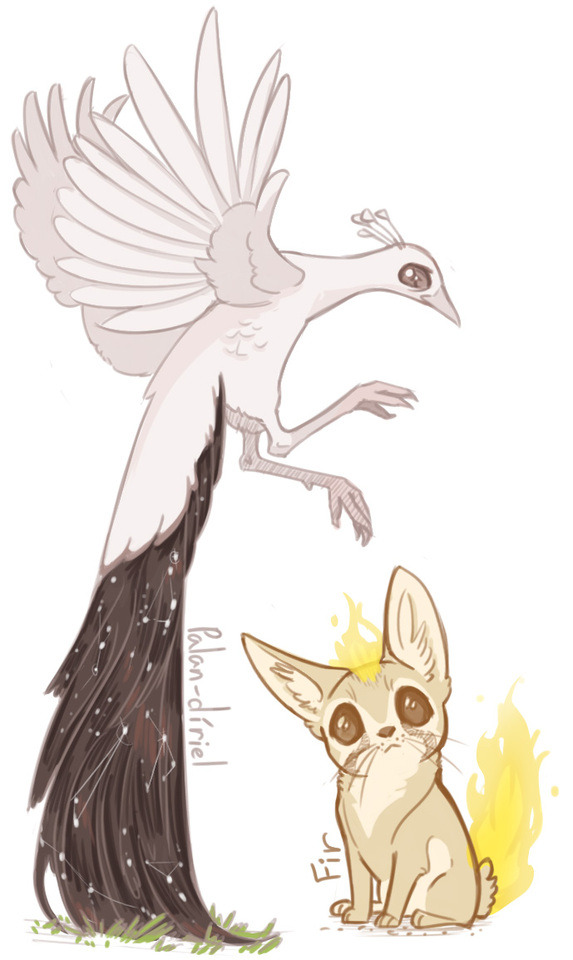
More Fir, and also my heaven shaman’s familiar, Palan-díriel :>
#Sovenasart#Pathfinder#Shamans#Shaman familiars#Familiars#Some precious babs who must be protected#Fun fact palan-díriel is an elven word for Far-gazer#Which I thought was appropriate for a heavens shaman familiar whose tail doubles as a star map#Gazing up far into the stars#And Fir is just short for Fire :y#Fir#Palan-díriel#Palan-diriel#In case I'm lazy when I look him up later.#Shaman names as well just in case#Elemmiire#Wysiir
7 notes
·
View notes
Text
Discarded Names for the House of Finwë
Someone on the SWG Discord asked if there was a list of discarded names and concepts for the House of Finwë, and I knew the idea wouldn’t let me alone until I compiled one myself, so here we are!!
Disclaimer: This is not comprehensive; I did my best to to find everything I could, but I didn’t actually scour through HoMe, just Tolkien Gateway and Parf Edhellen! If you know of a name/concept that I missed, let me know and I can add it! Additionally, I did not include every single possible alternate spelling for every name, though I did include some.
I hope this list is helpful for people who would like to re-incorporate these names and concepts back into their personal canon, or to create Finwean OCs, or just to learn more about the shaping of the Legendarium! I know I learned a thing or two!!
~~~
ALTERNATE NAMES
Unless otherwise indicated, these are names Tolkien used or considered before he settled on the version of the name that appears most frequently in canon.
Finwë :: Finu, Nólemë, Golfinweg (the latter two names were attached to a character who later split into both Finwë and Fingolfin)
Míriel :: Indis (who fell and died in a crevasse; only later did Indis appear as Finwë’s second wife)
Fëanor :: Daurlas → Daurin Tórin, Fionor, Phayanaro
Nerdanel :: Istarnië
Maedhros :: alternate spellings including ai or ei in place of ae &/or ð or d in place of dh; Maidros (meaning “pale-glitter”), Maenros, Maedron (actually a later concept)
Maglor :: Maelor
Celegorm :: Celecormë (linguistically related to Oromë), Celegorn
Caranthir :: Cranthir, Cranthor, Carastir / Carathir
Amras :: Díriel, Amros (actually a later name), Minyarussa
Amrod :: Damrod, Nambarauto (“hammerer of copper”), Atyarussa
Fingolfin :: Nólemë, Golfinweg, Fingolma, Ingolfin (linguistically related to Inglodo), Golfin son of Gelmir
Anairë :: Alairë
Fingon :: Fini(c/k)áno, Findi(c/k)áno, Finion, Fingorn, Finweg, Fingweg, Finbrand
Turgon :: Turondo, Sarafinwë
Elenwë :: Alairë → Anairë (this name was later given to the wife of Fingolfin)
Idril :: various alternate spellings using ð or đ in place of d &/or Í in place of the first I; Idhril and its Q. cognate Írildë (meaning “mortal maiden” as a reference to her marriage to Tuor; later “Írildë” became the name of a Númenórean woman), Tal-Celeb, Taltelepta (a translation of Celebrindal)
Tuor :: Tûr, Túor, “Tuor son of Peleg son of Indor of the house of the Swan of the sons of the Men of the North”
Eärendil :: Eärendel, Yarendl (yes, without a vowel between the d and l)
Elwing :: Ailuvin, Ailwing, Aelwyn; various other spellings
Elros :: Indilzar (which later became Gimilzôr), Elerossë
Elrond :: Elerondo
Aredhel :: Íreth (Sindarin cognate of Írissë), Isfin, Rodwen, Ar-Feiniel, Areðel
Maeglin :: Meglin, Mailin / Mailindo, Glindûr, Targlîn, Morlîn, Morleg
Írimë Lalwen :: Írien, Gladhwen (S. cognate of Lalwendë)
Finarfin :: Ingalaurë, Inglor, Finrod, Finarphin
Finrod :: Felagon, Inglor Felagund, Artafindë
Orodreth :: Rodreth, Artaher and its Sindarin cognate Arothir (actually later names meant to replace Artaresto / Orodreth)
Finduilas :: Findóriel
Gwindor :: Flinding, Findor son of Fuilin
Aegnor :: Aikanár, Eignor, Goenor, Egnor (the son of Rimion and the father of Beren; yes that Beren, in the version where he was a Gnome)
Galadriel :: Altáriel, Ñaltáriel, Caladriel, Galaðriel, Nerwendë
Celeborn :: Teleporno, Telporno
Arwen :: Elrenniel, Elerondiel, Aranwen; Parf Edhellen also says that Tolkien changed her name in the following order: Ellonel → Finduilas → Emrahil → Arwen
Gil-galad :: Ñgillingalati, Finellach, Finwain (in addition to the more widely-known names Ereinion and Artanáro / Rodnor)
~~~
DISCARDED CHARACTER CONCEPTS
Maidros :: a grandfather of Fëanor (and great-grandfather of Fëanor’s son Maidros) Bruithwir :: the son of Maidros and father of Fëanor; Tolkien also considered making him Fëanor’s brother Daurin Tórin :: a Fëanor-esque figure, sometimes replacing Fëanor and sometimes existing alongside him
Finvain :: a daughter of Finwë and Indis Faniel :: a daughter of Finwë and Indis Finrun :: a son of Finwë; alt. Felageómor
Findobar :: a son of Fingon; alt. Findabar Finbor :: a son of Fingon and brother of Erien Erien :: a daughter of Fingon and sister of Finbor
Meril :: the wife of Finrod (pre-Amárië)
Hallas :: a son of Orodreth Orodlin :: a son of Orodreth and brother of Haldir Haldir :: a son of Orodreth and brother of Orodlin; altered from Halmir; both Haldir and Halmir later became names for Chieftains of the Haladin
ETA: Hallas is NOT actually a son of Orodreth; this is an unsubstantiated claim with no evidence first made on Tolkien Gateway and then spread elsewhere.
Amroth :: Tolkien briefly considered making him the son of Galadriel and Celeborn, but this was later discarded
#silm#silmarillion#the silmarillion#finweans#home#history of middle earth#tefain nin#silm meta#tolkien meta#swg#thank you tolkiengateway and parf edhellen
137 notes
·
View notes
Photo
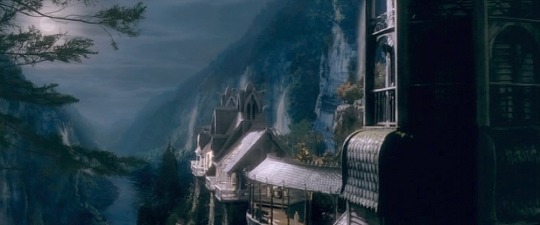
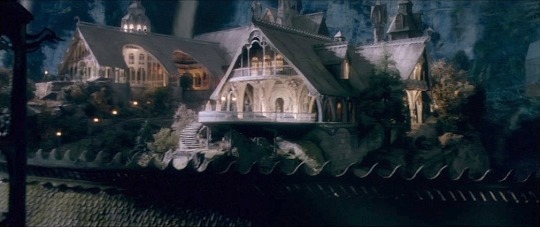
Good night, Frodo!
Bless me, but it has been good to see you again! There are no folk like hobbits after all for a real good talk. I am getting very old, and I began to wonder if I should ever live to see your chapters of our story. Good night! I'll take a walk, I think, and look at the stars of Elbereth in the garden. Sleep well!'
A Elebereth Gilthoniel silivren penna míriel o menel aglar elenath! Na-chared palan-díriel o galadhremmin ennorath Fanuilos, le linnathon nef aear, si nef aeron!
JRR Tolkien recites the Elvish hymn to Varda (translation)
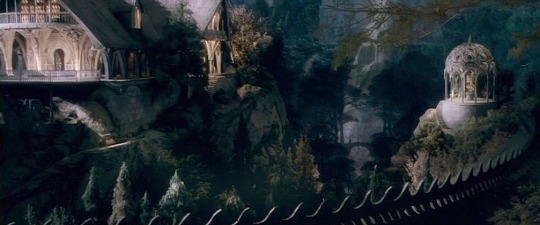
JRR Tolkien, The Lord of the Rings, The Fellowship of the Ring, Flight to the Ford, Many Meetings
#the lord of the rings#the fellowship of the ring#many meetings#jrr tolkien#bilbo#frodo#rivendell#imladris#poetry#elbereth#gilthoniel#varda#elvish hymn#audio#movie pics#peter jackson
8 notes
·
View notes
Photo
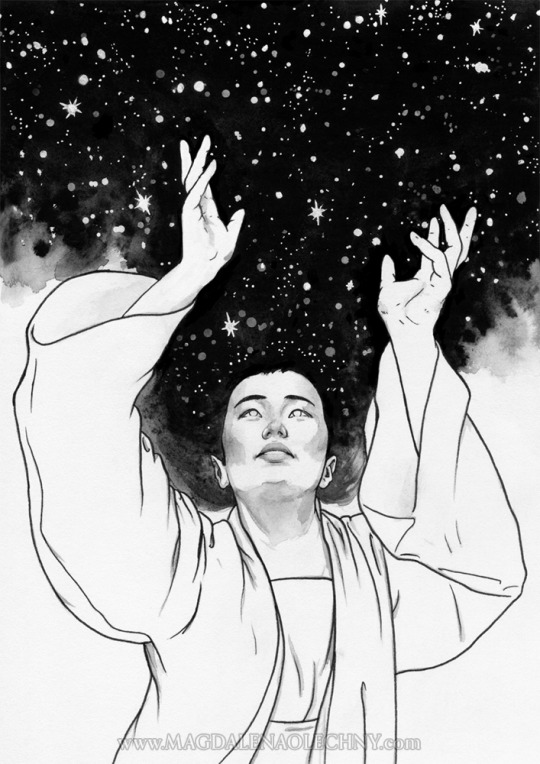
A Elbereth Gilthoniel silivren penna míriel o menel aglar elenath! Na-chaered palan-díriel o galadhremmin ennorath, Fanuilos, le linnathon nef aear, sí nef aearon!
The Lord of the Rings, J.R.R. Tolkien
www.magdalenaolechny.com
307 notes
·
View notes